Sandra Beasley's Blog, page 16
April 6, 2012
Kevin McFadden's HARDSCRABBLE
Last night I heard Kevin McFadden and Angie Hogan read at Cafe Muse. It had been far too long since I got to be in the audience for a poetry reading; a very weird side effect of giving them so often. Thanks to Kevin and Angie for coming up from Charlottesville and joining me and Cafe Muse host Hailey Leithauser for a drink afterwards.
I loved Angie's work, particularly "Apologia at Clinchfield Yards," which you can read here thanks to Poetry Daily (it first appeared in The Threepenny Review). The poem pulls no punches; the Clinchfield Railroad Yard near Erwin, Tennessee, was the actual hanging site of Mary the elephant. There's a photo you can find online, but I can't bear to post it here. "Apologia" now ranks alongside Dan Chiasson's "The Elephant" in my kingdom of favorite pachyderm poems.
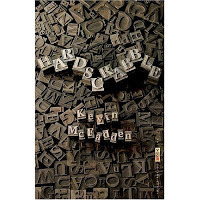 When Kevin McFadden's HARDSCRABBLE first came out I know I got a copy, but I lent it to a friend and never got it back. I was happy to reunite myself with a second copy last night. These complex, acrobatic, language-obsessed poems are not only smart but fun. As Hailey said in her introduction, Kevin is a "word-drunk," the best possible kind. Here is one of his anagrammatic poems from the book, which opens with a line from Langston Hughes and then plays with different incarnations of the text in provocative and meaningful ways:
When Kevin McFadden's HARDSCRABBLE first came out I know I got a copy, but I lent it to a friend and never got it back. I was happy to reunite myself with a second copy last night. These complex, acrobatic, language-obsessed poems are not only smart but fun. As Hailey said in her introduction, Kevin is a "word-drunk," the best possible kind. Here is one of his anagrammatic poems from the book, which opens with a line from Langston Hughes and then plays with different incarnations of the text in provocative and meaningful ways:
MEDITATE FROM SEA TO SEA
Let America be America again.
Ice-age ambiance. Later a mira-
cle air: a meat mania, ice-barge,
ice-amble. A tie. Agrarian came
later, Inca came, a bare image I
bear. An Eric came, agile at aim
(let America be a maniac, I rage).
Italian came--macabre, I agree.
Came Iberia, came Angle, a rat I
Rate, a marine bilge. Came a CIA
angelic era, a tame iambic ear.
Bacteria came in a mire, algae
era. Militia came, began a race,
a crime, eager aim, Cain at Abel.
At Abe L. Imagine a ceramic era,
ceramic ear: I am it. A lab. A gene
I age. A meme trace. A bicranial
air age, a bicameral cinema, et
cetera, a manic beige malaria,
a carnage. American I let be. I am
a cameraman, I create a big lie
(let America be a camera I gain),
I am a cabaret emcee, a girl in a
Miami tribe, an eagle, a car, ace
Airman. Elegaic America, a bet:
let America be a magic arena I
anagram. I bet I care (came a lie,
a clear image), I bet America an
animal acreage, I bet America
beer I can amalgamate air, ice-
berg. An ale. Ace-at-ear, I mimic a
man (bare me) I glaciate Americana--
I'm a rain. Let America be a cage;
I remain a gate, a Mecca. I blare
Niagra, I accelerate, maim, be
a beam, I emanate a grail, Circe
mirage. America, a neat cable I
tie in. America, a gala embrace.
Let America be America: a gain.
#
I loved Angie's work, particularly "Apologia at Clinchfield Yards," which you can read here thanks to Poetry Daily (it first appeared in The Threepenny Review). The poem pulls no punches; the Clinchfield Railroad Yard near Erwin, Tennessee, was the actual hanging site of Mary the elephant. There's a photo you can find online, but I can't bear to post it here. "Apologia" now ranks alongside Dan Chiasson's "The Elephant" in my kingdom of favorite pachyderm poems.
 When Kevin McFadden's HARDSCRABBLE first came out I know I got a copy, but I lent it to a friend and never got it back. I was happy to reunite myself with a second copy last night. These complex, acrobatic, language-obsessed poems are not only smart but fun. As Hailey said in her introduction, Kevin is a "word-drunk," the best possible kind. Here is one of his anagrammatic poems from the book, which opens with a line from Langston Hughes and then plays with different incarnations of the text in provocative and meaningful ways:
When Kevin McFadden's HARDSCRABBLE first came out I know I got a copy, but I lent it to a friend and never got it back. I was happy to reunite myself with a second copy last night. These complex, acrobatic, language-obsessed poems are not only smart but fun. As Hailey said in her introduction, Kevin is a "word-drunk," the best possible kind. Here is one of his anagrammatic poems from the book, which opens with a line from Langston Hughes and then plays with different incarnations of the text in provocative and meaningful ways:MEDITATE FROM SEA TO SEA
Let America be America again.
Ice-age ambiance. Later a mira-
cle air: a meat mania, ice-barge,
ice-amble. A tie. Agrarian came
later, Inca came, a bare image I
bear. An Eric came, agile at aim
(let America be a maniac, I rage).
Italian came--macabre, I agree.
Came Iberia, came Angle, a rat I
Rate, a marine bilge. Came a CIA
angelic era, a tame iambic ear.
Bacteria came in a mire, algae
era. Militia came, began a race,
a crime, eager aim, Cain at Abel.
At Abe L. Imagine a ceramic era,
ceramic ear: I am it. A lab. A gene
I age. A meme trace. A bicranial
air age, a bicameral cinema, et
cetera, a manic beige malaria,
a carnage. American I let be. I am
a cameraman, I create a big lie
(let America be a camera I gain),
I am a cabaret emcee, a girl in a
Miami tribe, an eagle, a car, ace
Airman. Elegaic America, a bet:
let America be a magic arena I
anagram. I bet I care (came a lie,
a clear image), I bet America an
animal acreage, I bet America
beer I can amalgamate air, ice-
berg. An ale. Ace-at-ear, I mimic a
man (bare me) I glaciate Americana--
I'm a rain. Let America be a cage;
I remain a gate, a Mecca. I blare
Niagra, I accelerate, maim, be
a beam, I emanate a grail, Circe
mirage. America, a neat cable I
tie in. America, a gala embrace.
Let America be America: a gain.
#
Published on April 06, 2012 06:50
April 2, 2012
Susquehuh?
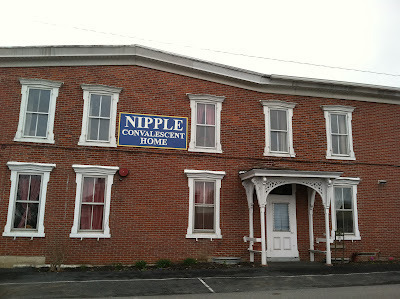
Yesterday I spent many hours snaking down Route 15 south--from the Finger Lakes region of New York, through western Pennsylvania, on my way back home to DC. The signage along the Susquehannah River was not like anything I had ever encountered. This is coming from a girl who has spent a lot of time in the deep South, which I had always thought had the monopoly on memorable signage. A few favorites:
-"Nipple Convalescent Home"
-"Green Shingle Inn" (not an inn at all, but a restaurant)
-"Chipmunk Pistol $139.95"
-The oddly poetic McDonald's sign asking:
Do not go ordinary-- Try our spicy chicken---"County Line Beverage" (points for honesty!)
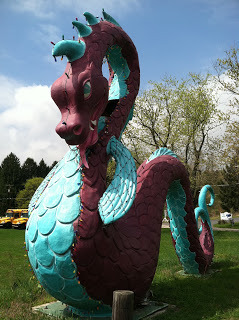 Also, this friendly sea dragon.
Also, this friendly sea dragon. He lives next to the Burgundy Steakhouse--which is not, as far as I can tell, dragon-themed.
I have named him Lester.
Published on April 02, 2012 08:56
March 28, 2012
Pittsburgh!
 This week I return to Pittsburgh, one of my favorite towns. The first time I drove here I did not know what to expect--bare steel and depressing concrete, perhaps--so I was shocked by the verdant hills, graceful bridges (more than Venice, so goes the rumor), and the bright iron colors that accent rather than constrain the landscape. This is the Pittsburgh Plate Glass Building, a.k.a a modern castle. Magic. And it's not just the place, it is the people: there is a real underdog enthusiasm here when it comes to the arts scene. Last night I gave a reading as part of the Point Park University Poetry Series to 111 people. Afterwards at least a dozen students lined up, books in hand, to share their dreams of becoming writers. It takes your breath away.
This week I return to Pittsburgh, one of my favorite towns. The first time I drove here I did not know what to expect--bare steel and depressing concrete, perhaps--so I was shocked by the verdant hills, graceful bridges (more than Venice, so goes the rumor), and the bright iron colors that accent rather than constrain the landscape. This is the Pittsburgh Plate Glass Building, a.k.a a modern castle. Magic. And it's not just the place, it is the people: there is a real underdog enthusiasm here when it comes to the arts scene. Last night I gave a reading as part of the Point Park University Poetry Series to 111 people. Afterwards at least a dozen students lined up, books in hand, to share their dreams of becoming writers. It takes your breath away. 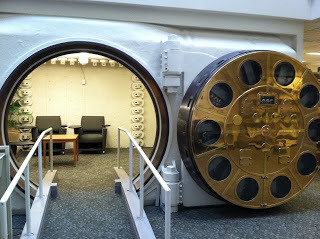
The Point Park University "campus" makes a space for itself by reclaiming buildings originally dedicated for other purposes. It is very vertical, very dense. My reading took place in an auditorium of a former hotel that also houses academic offices, classrooms, and student housing. My master class took place in an old bank that has been turned into a library--including this reading room fashioned from the vault.
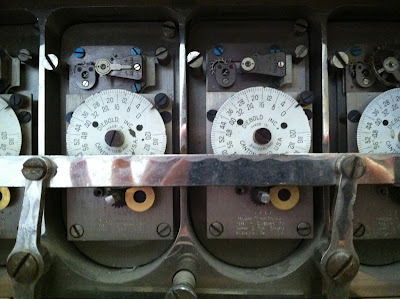
Our master class was on the sestina, so a close-up of the vault's combination lock feels apropos. We looked at examples from Philip Sidney, Elizabeth Bishop, Miller Williams, and Sonya Huber. The students were totally tuned in--it was a lot of fun--and I think (I hope) that we banished the bum rap that the sestina is an inherently inorganic, forced form of writing. For certain topics and certain voices, the turn of those endwords serves a vital purpose. You just gotta get the tumblers lined up right.
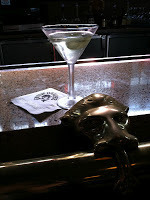
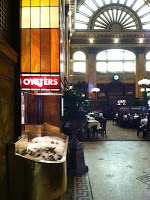 Before my reading I went to the Gandy Dancer Saloon for a gimlet and their "Buck a Shuck" happy hour. The Saloon is part of the Grand Concourse, which opened in 1978 but looks a century older (the building was built in 1900 to house the Pittsburgh Terminal Train Station). I had John Jeremiah Sullivan's Pulphead, and for an hour I enjoyed that rarest of pleasures: reading on the road. Sullivan is an interesting and higly self-aware essayist; I was unexpectedly moved by his meditation on Michael Jackson, of all people.
Before my reading I went to the Gandy Dancer Saloon for a gimlet and their "Buck a Shuck" happy hour. The Saloon is part of the Grand Concourse, which opened in 1978 but looks a century older (the building was built in 1900 to house the Pittsburgh Terminal Train Station). I had John Jeremiah Sullivan's Pulphead, and for an hour I enjoyed that rarest of pleasures: reading on the road. Sullivan is an interesting and higly self-aware essayist; I was unexpectedly moved by his meditation on Michael Jackson, of all people.The poet who brought me here is Sarah Perrier, the author of Nothing Fatal, and afterwards I joined her and fiction professor Karen Dwyer for a meal at Salt of the Earth. (Mmmm. How did I go this long without knowing the wonder of "duck ham"?) One of my favorite parts of book tour is meeting the faculty at these schools, so have often put in hours of works to fight for the creative writing programs that their undergrads crave. Both women are forceful, smart, and funny, with a legion of devoted students. Point Park is lucky to have them.
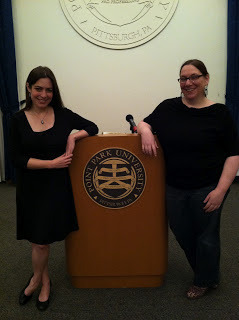
From here I journey to New York state for the Alfred Literary Festival. I'm excited to give the kick-off reading on Thursday afternoon--and to hang out with Juliana Gray, an incredibly talented poet and the author of Roleplay, the forthcoming winner of the Orphic Book Prize from Dream Horse Press. I first met Juliana the Sewanee Writer's Conference, and (ahem) her drinking ability rivals my own. There will be hijinks. I'll be reading alongside Ed Falco, a novelist who heads up the MFA program at Virginia Tech and is carrying on the story of the Corleone family with a prequel to Mario Puzo's The Godfather, which is coming out in May. When I first met Ed at AWP this year, he was wearing a leather jacket. In otherwords: double the hijinks. Onwards~
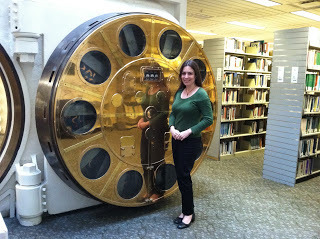
(As I sing the praises of Pittsburgh, I can hear a horrific thunderstorm come on. All right, city, I get it! Something has to happen to make those hills so emerald green....)
Published on March 28, 2012 08:35
March 21, 2012
The Horizon
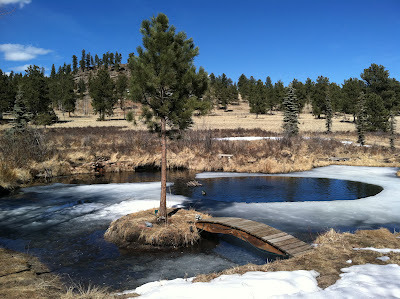
This week I have four readings as part of my term as the Writer-in-Residence for the Howard County Poetry & Literature Society (HoCoPoLitSo). At one of the high schools a student asked about "the hardest part of being a full-time writer." I answered it was not only being a full-time writer but being a full-time secretary, publicist, and travel agent. In other words, it would be a mistake to think that being an writer is the same as giving oneself more time to write, at least in my case. I felt my answer was a bit disappointing (or perhaps too bureaucratic), but it was honest. Some weeks it is all I can do to keep my paperwork in order and clean clothes in my suitcase.
That said, last week this job took me to Colorado. Yes, I had to hit the ground running--make the plane, get the rental car--and I did five readings and classroom visits in less than 36 hours in Denver and Pueblo. But then got to steal an extra day and a half to spend with long-lost family in their mountain home, where I got to shower outside, by a lake (the view above), and then watch sunrise over the same pond (the view below). I might not have gotten much time to write last week (save a new Modern Alice story, "Old Flame," which I shyly drafted while flying Frontier Airlines), but I will never take such weeks for granted.
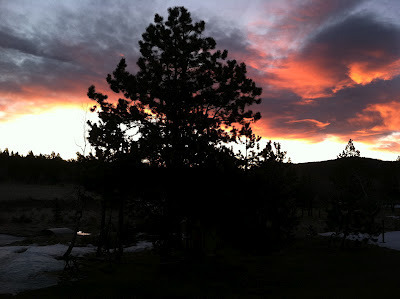
Speaking of the horizon...so many things coming up in March and April! Look to the right & you'll see I'm busy--this weekend's Virginia Festival of the Book in Charlottesville, a seminar at The Writer's Center, trips to Pittsburgh and New York. But let me draw your attention to non-Sandra-centric events that promise to be great....
FRIDAY, MARCH 23 - 7:30 PM - EMERGING WRITER FELLOWS READING
The Writer's Center is located at 4508 Walsh Street, Bethesda, MD 20815.
Three of the Writer's Center's 2011–2012 Emerging Writer Fellows come together to share their award-winning work with our community. This event is free. Don't miss this opportunity to see rising stars in American fiction and poetry.
Featuring...
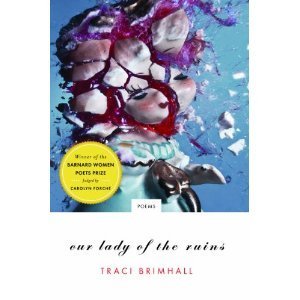 TRACI BRIMHALL - Brimhall is the author of Our Lady of the Ruins, selected by Carolyn Forché for the 2011 Barnard Women Poets Prize, and Rookery, winner of the 2009 Crab Orchard Series in Poetry First Book Award. Her poems have appeared in New England Review, The Virginia Quarterly Review, The Missouri Review, The Kenyon Review, Poet Lore, and Southern Review. She teaches at Western Michigan University where she is a doctoral candidate and a King/Chávez/Parks Fellow.
TRACI BRIMHALL - Brimhall is the author of Our Lady of the Ruins, selected by Carolyn Forché for the 2011 Barnard Women Poets Prize, and Rookery, winner of the 2009 Crab Orchard Series in Poetry First Book Award. Her poems have appeared in New England Review, The Virginia Quarterly Review, The Missouri Review, The Kenyon Review, Poet Lore, and Southern Review. She teaches at Western Michigan University where she is a doctoral candidate and a King/Chávez/Parks Fellow.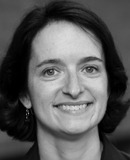 JOANNE DIAZ - Diaz is the recipient of fellowships from the National Endowment for the Arts, the Illinois Arts Council, The New York Times Foundation, and the Bread Loaf Writers Conference. Her book, The Lessons, won the Gerald Cable first book award and was published in 2011. Her poems have been published in AGNI, The American Poetry Review, The Southern Review, and Third Coast. She is an assistant professor in the English department at Illinois Wesleyan University.
JOANNE DIAZ - Diaz is the recipient of fellowships from the National Endowment for the Arts, the Illinois Arts Council, The New York Times Foundation, and the Bread Loaf Writers Conference. Her book, The Lessons, won the Gerald Cable first book award and was published in 2011. Her poems have been published in AGNI, The American Poetry Review, The Southern Review, and Third Coast. She is an assistant professor in the English department at Illinois Wesleyan University.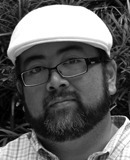 IRA SUKRUNGRUANG - Sukrungruang is a Thai American, born and raised in the southside of Chicago. He co-edited with Donna Jarrell two literary anthologies about fat: What Are You Looking At? The First Fat Fiction Anthology and Scoot Over, Skinny: The Fat Nonfiction Anthology. His work has appeared in The Sun, Creative Nonfiction, North American Review, and other literary journals. Recently, his memoir, Talk Thai: The Adventures of Buddhist Boy, was published by University of Missouri Press. He is the co-founder of Sweet: A Literary Confection, an online periodical, and teaches in the M.F.A. program at University of South Florida.
IRA SUKRUNGRUANG - Sukrungruang is a Thai American, born and raised in the southside of Chicago. He co-edited with Donna Jarrell two literary anthologies about fat: What Are You Looking At? The First Fat Fiction Anthology and Scoot Over, Skinny: The Fat Nonfiction Anthology. His work has appeared in The Sun, Creative Nonfiction, North American Review, and other literary journals. Recently, his memoir, Talk Thai: The Adventures of Buddhist Boy, was published by University of Missouri Press. He is the co-founder of Sweet: A Literary Confection, an online periodical, and teaches in the M.F.A. program at University of South Florida.***
MONDAY, APRIL 2 - 7 PM - CAFE MUSE LITERARY SERIES
The Word Works presents monthly literary programs that open with Michael Davis on classical guitar. Open readings follow the featured readers. Sign up begins at 7:00pm. This event is free to the public. Friendship Heights Village Center is a five-minute walk from the Friendship Heights Metro stop (red line) at 4433 South Park Avenue, Chevy Chase, Maryland.
Featuring...
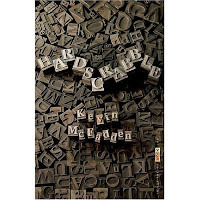 KEVIN MCFADDEN - McFadden is the author of Hardscrabble (University of Georgia Press), which received the George Garrett Award for poetry from the Fellowship of Southern Writers and the Great Lakes College Association's New Writers Award. His poems have appeared in American Letters & Commentary, Fence, Kenyon Review, Poetry, and in other publications. He is the Chief Operating Officer at the Virginia Foundation for the Humanities.
KEVIN MCFADDEN - McFadden is the author of Hardscrabble (University of Georgia Press), which received the George Garrett Award for poetry from the Fellowship of Southern Writers and the Great Lakes College Association's New Writers Award. His poems have appeared in American Letters & Commentary, Fence, Kenyon Review, Poetry, and in other publications. He is the Chief Operating Officer at the Virginia Foundation for the Humanities.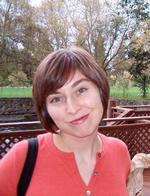
ANGIE HOGAN - Hogan's poems have been published in journals including The Antioch Review, Ploughshares, The Threepenny Review, and The Virginia Quarterly Review. She holds degrees from Vanderbilt University and the University of Virginia, where she was a Hoyns Fellow as well as the recipient of a Javits Fellowship. She lives near Charlottesville and works at the University of Virginia Press.
***
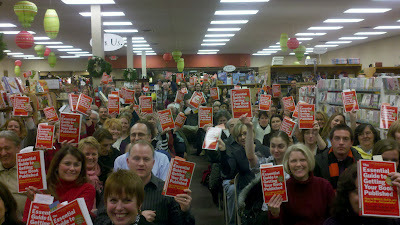
WEDNESDAY, APRIL 11 - 7 PM - PITCHAPALOOZA!
Politics & Prose at 5015 Connecticut Ave NW, Washington, DC 20008
WHAT: Pitchapalooza is American Idol for books (only without Simon). Twenty writers will be selected at random to pitch their book. Each writer gets one minute—and only one minute! In the last month, three writers have gotten publishing deals as a result of participating in Pitchapalooza.
WHO: Arielle Eckstut and David Henry Sterry are co-founders of The Book Doctors, a company dedicated to helping authors get their books published. They are also co-authors of The Essential Guide to Getting Your Book Published: How To Write It, Sell It, and Market It… Successfully (Workman, 2010). Arielle Eckstut has been a literary agent for 18 years at The Levine Greenberg Literary Agency. She is also the author of seven books and the co-founder of the iconic brand, LittleMissMatched. David Henry Sterry is the best-selling author of 12 books, on a wide variety of subject including memoir, sports, YA fiction and reference. They have taught their workshop on how to get published everywhere from Stanford University to Smith College.
HOW: At Pitchapalooza, judges will help you improve your pitch, not tell you how bad it is. Judges critique everything from idea to style to potential in the marketplace and much, much more. Authors come away with concrete advice as well as a greater understanding of the ins and outs of the publishing industry. Whether potential authors pitch themselves, or simply listen to trained professionals critique each presentation, Pitchapalooza is educational and entertaining for one and all. From Miami to Portland, from LA to NYC, and many stops along the way, Pitchapaloozas have consistently drawn standing-room-only crowds, press (a New York Times article) and blog coverage, and the kind of bookstore buzz reserved for celebrity authors.
PRIZE: At the end of Pitchapalooza, the judges will pick a winner. The winner receives an introduction to an agent or publisher appropriate for his/her book.
PRICE OF ADMISSION: To sign up to pitch, you must purchase a copy of The Essential Guide To Getting Your Book Published. Anyone who buys a copy of receives a FREE 20 minute consultation, a $100 value. If you don't want to pitch, the event is FREE.
...C'mon guys, you have to admit: this is intriguing. If I'm in town, I'll be there.
Published on March 21, 2012 21:21
March 12, 2012
Samantha
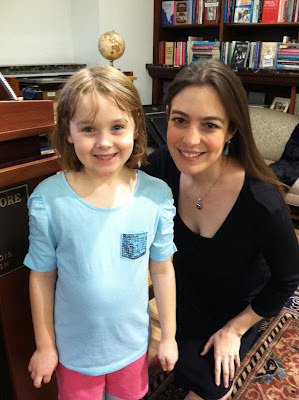
Thanks to all who came out for my events in Illinois last week. In Urbana, I was lucky enough to join host David Inge for an hour-long "Focus" interview on WILL, the local NPR affiliate. You can hear the entirety of our conversation here (MP3 or streaming).
My discussion of Don't Kill the Birthday Girl caught the ear of a mother whose daughter, Samantha, is both an aspiring poet and someone with firsthand food allergy experience. They fought post-school traffic to join us for a packed afternoon reading at the Illini Union Bookstore. Samantha, a whip-smart kid if there ever was one, was kind enough to share this poem that she had written just that day:
TOOTH
A white
small pearl in
your mouth.
When it wiggles a
big
pearl is
growing
in.
*
It is 6 AM as I type this, readying to hop a plane to Colorado. Last night I got to sleep in my bed for the first time in two weeks...for a whole three hours. My feet are swollen from piggybacking a drive to & from Illinois and with a weekend trip to & from Charleston for a friend's wedding. But it is worth it. You hit the road each time hoping, just hoping, you're lucky enough to meet a girl like Samantha.
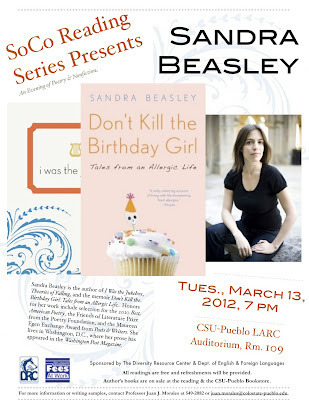
Published on March 12, 2012 03:14
March 5, 2012
Thoughts from Chicago ~ AWP 2012
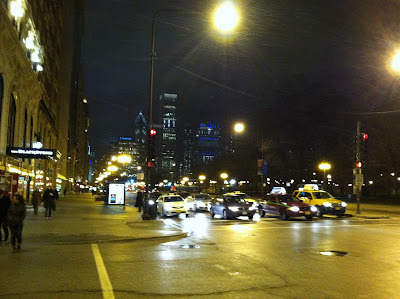
I was catching up with a friend about March travel plans. She stopped me and said, "Something's weird when you're thinking about AWP as your downtime." But it's true; AWP was the only week this month when I didn't have a single formal reading or speaking commitment. I was free to float and, thanks to the Hilton's draconian fees, forced onto an email diet. My roommate was the fabulous poet and indomitable AWP veteran Erika Meitner. She's the friend with whom you know you can always share a sidelong look or three--a necessity when hanging out in the hotel bar.
A major shift for me was paying attention to the creative nonfiction offerings in this year's conference schedule. A couple of tips: anytime you see the names of Cheryl Strayed, Stephen Elliott, Robin Hemley, or Daniel Nester in the line-up, GO. It will be a good one. I came away with real insights on the question of whether it is possible to "sell out" the ones you love in writing memoir; using immersion or travel to enrich storytelling; and thinking outside the box of promoting one's work, even if that means getting over yourself as a capital-A Author. Stephanie Elizondo Griest perfectly articulated my hesitation about memoirs that intersect with contemporary experience: "This style of writing has ethical landmines all over the place...is it fair [to new friends/subjects/loved ones] that by virtue of hanging out with you, they have become part of your literary petri dish?"
Todd Zuniga had a basic but brilliant point on why you should always, always keep your readings short: "What people want to know is whether or not they like you."
In Chicago, I have realized that I need to stop thinking about using my identity as a writer to promote/support any one book. I need to stop introducing myself as a poet when among poets, as a memoirist when among creative nonfictioneers, as a sometimes Washington Post contributor when when among journalists. I need to introduce myself as a writer. Period. I have to start looking at every book as one in a series of (I hope) many, one that evolves but does not define my success. There will be growing pains in changing mindsets, but they are necessary, and embracing those pains was worth the cost of the hotel in & of itself.
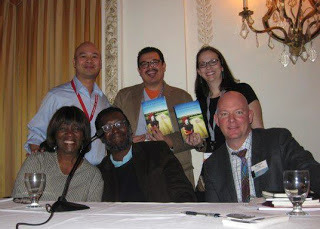 The panel that did the best job of mixing commentary with brief but stunning readings was "A Face to Meet the Faces: Five Poets on Persona, Empathy, and Race" with Stacey Lynn Brown, Eduardo C. Corral, Cornelius Eady, Patricia Smith, Jake Adam York. Everyone walked out buzzing about the anthology. I used Oliver's camera to get a snapshot of the crew; seriously, these folks could take this show on the road to paying audiences.
The panel that did the best job of mixing commentary with brief but stunning readings was "A Face to Meet the Faces: Five Poets on Persona, Empathy, and Race" with Stacey Lynn Brown, Eduardo C. Corral, Cornelius Eady, Patricia Smith, Jake Adam York. Everyone walked out buzzing about the anthology. I used Oliver's camera to get a snapshot of the crew; seriously, these folks could take this show on the road to paying audiences. My last panel of the conference was "Men from Venus, Women from Mars: Writing from the Perspective of the Opposite Sex" with Reese Okyong Kwon, Jennine Capó Crucet, Alan Heathcock, Kyle Minor and Kevin Wilson. It may have been one of the most platonically perfect panels I have ever attended. And that's as a poet and memoirist--meaning this wasn't even particularly relevant to my writing practice. Much as when I read fiction, I could just sit back...and enjoy. Every author was articulate, keeping their remarks short up front, building on each other's comments rather than repeating each other, answering a moderated Q&A with additional insights.
I knew Jennine would be great; we read together for The Potomac Review's anniversary last year. She made really nice craft-centric points about differentiating between using gender to shape a character's internal self (what someone would think or pay attention to) and using gender-appropriate dialogue (what someone would say out loud to reflect those things). Those concerns are overlapping but not congruent.
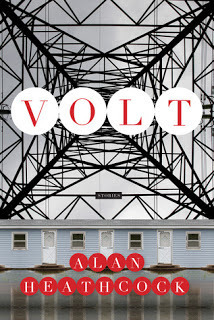 Alan Heathcock was a revelation, and I am going to go out and buy VOLT just from having heard his intelligence and dry humor as a speaker. Besides, who could resist that cover? Heathcock resists being daunted by writing across gender lines, pointing out that the main goal must be authenticity of a unique character's emotions and motives. Noting that in his first story collection gender is never a core issue ("None of my female characters menstruate on the page"), he admitted the challenge emerged with his next project. "My current book has a 17 year-old pregnant girl, so I'm having to ask my wife a lot of questions. Which is fine. Just like when I wrote about a chicken farmer, I had to ask a lot of questions to a chicken farmer. [Pause.] Not to equate chicken farming with pregnancy."
Alan Heathcock was a revelation, and I am going to go out and buy VOLT just from having heard his intelligence and dry humor as a speaker. Besides, who could resist that cover? Heathcock resists being daunted by writing across gender lines, pointing out that the main goal must be authenticity of a unique character's emotions and motives. Noting that in his first story collection gender is never a core issue ("None of my female characters menstruate on the page"), he admitted the challenge emerged with his next project. "My current book has a 17 year-old pregnant girl, so I'm having to ask my wife a lot of questions. Which is fine. Just like when I wrote about a chicken farmer, I had to ask a lot of questions to a chicken farmer. [Pause.] Not to equate chicken farming with pregnancy."Kevin was his typically modest self. "The terrifying thing about going last is that all of the best stuff has already been said," he observed. "The awful thing is looking at what you planned to say and realizing that it contains none of that stuff. So let's just get through this." He then went on to give a beautiful, vulnerable account of some of the editorial insecurities he grappled with in both Tunneling to the Center of the Earth (confiding that the gender of one story narrator has been switched from the original draft) and in taking on the POVs of both a brother and a sister in The Family Fang. He dared emphasize not where he had succeeded, but where he feels he may have failed, may continue to fail, and thus is compelled to explore.
Headliner readings by Audrey Niffenegger, Lyn Hejinian, and Irvine Welsh were the best kind--changing my understanding of styles that border on the iconic (perhaps causing us to not read the text as closely as we should). These readings made me laugh. These readings complicated my understanding of the authors, challenged me. Plus, Welsh spat into the microphone to simulate the sound of a nail gun going off. He squatted onstage during a bathroom scene. The man has no filter.
My tradition of minimizing meals out continues. When it works, it works. I loved the afternoon simplicity of 20 minutes in my room, spooning smoked oysters onto Triscuits, eating fresh blueberries by the handful for dessert, all in blissful utter silence. That said, I have yet to perfect the amount of hot water that should be fed through the coffee machine to make instant oatmeal--resulting on more than one occasion into a strange sugary, raisined gruel that was not the cheeriest way to start the morning.
The flask continues to come in handy, and every year I notice a few more folks carrying. It's not necessarily that I'm a cheapskate. Even at receptions where the alcohol is free, I feel silly waiting in line for 25 minutes to receive it. Not to mention that the scotch available tends to be Johnnie Walker Black, my least favorite. If you were looking for my at Kitty O'Shea's, I apologize; I took to hanging out in the other bar (which I spent four days calling "non-Kitty") when I realized that space was more flask-friendly.
The downside of non-Kitty was that they closed down early. At one point Stephen Burt reached behind the bar to steal glasses and fish out ice from the bin himself, annoyed that it wasn't even 1 AM and they were refusing us even water. I worried a waiter would yell at him, which would have been the oddest kind of trouble-making to befall someone on the NBCC Board. I was so flattered by his chivalry that I couldn't bear to tell him the glass he used for me was clearly waiting to be washed.
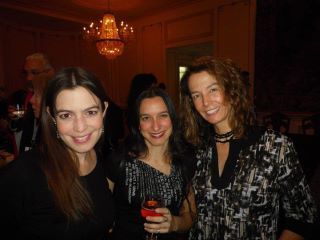 Me, Melissa Stein, and Marie-Elizabeth MaliOn Saturday as they turned up the lights and pushed us out, I bumped into Sewanee friend Frank Giampietro. Each recognizing the other was still conversation-hungry, we impulsively hopped in the elevator and got off on one of those mysterious renovated floors (11? 13?). We sat on the white leather lobby couch, trespassers. We clinked flasks. We talked, confided, and commiserated for one last stolen hour of AWP. Those were the best kinds of conversations--the real one-on-ones--and I was grateful for similar moments with Heather Hartley, Marie-Elizabeth Mali, Jehanne Dubrow, Douglas Ray, Daniel Nester, Steve Schroeder, and Martha Silano. In the case of Nick Flynn I had to settle for a long elevator ride from the 21st Floor to the Lobby...but what can you do? The man is busy. I'd have been happy with just 6 or 7 floors. I was also content to know that Dear Sugar's room was on my hall, even though we never actually spoke. I suppose syntactically she's just "Sugar," but she is Dear to me.
Me, Melissa Stein, and Marie-Elizabeth MaliOn Saturday as they turned up the lights and pushed us out, I bumped into Sewanee friend Frank Giampietro. Each recognizing the other was still conversation-hungry, we impulsively hopped in the elevator and got off on one of those mysterious renovated floors (11? 13?). We sat on the white leather lobby couch, trespassers. We clinked flasks. We talked, confided, and commiserated for one last stolen hour of AWP. Those were the best kinds of conversations--the real one-on-ones--and I was grateful for similar moments with Heather Hartley, Marie-Elizabeth Mali, Jehanne Dubrow, Douglas Ray, Daniel Nester, Steve Schroeder, and Martha Silano. In the case of Nick Flynn I had to settle for a long elevator ride from the 21st Floor to the Lobby...but what can you do? The man is busy. I'd have been happy with just 6 or 7 floors. I was also content to know that Dear Sugar's room was on my hall, even though we never actually spoke. I suppose syntactically she's just "Sugar," but she is Dear to me. Ah. Add to that list of one-on-one chats my time with AWP Board member and Orchises editor Roger Lathbury, who I got to talk to in the Conrad Hilton suite, also known as the top-floor duplex where Liz Taylor took a lot of jacuzzi baths and Obama found out he won the presidency. This was the site of the lovely fancypants party--fresh cut jicama!--where VIPs could watch Taylor Mali play pool and, incidentally, watch Taylor murder the palm tree that periodically interfered with his shots. Whenever I see Roger, I remind him that the first time we met was at a past fancypants party when he composed a poem for me on the spot. He always reminds me that was after I asked him to stop staring at my crotch or, rather, the long-corded name tag hanging immediately above my crotch. This was as Martin Amis stood nearby, smoking indoors and apologizing for offending my female sensibility. You gotta love AWP, and with that you gotta love Roger Lathbury. This time we talked about Henry Taylor, a topic that always makes me happy, and my sister, a topic that always makes me even happier, and the surviving lover of a famous reclusive writer, a topic that elicited a hilarious facial expression that will not be further described here.
Next year the conference goes to Boston. Have you reserved a room yet? Kidding! Kidding. Kinda. It'll be good to return to Boston after this fall's Book Festival. I'd love to be asked to do a reading (is that too pathetic a hint?), and if not I'll throw my hat in the ring to coordinate a panel or two--Michael Martone is on board for a discussion of Lewis Hyde's THE GIFT that could be amazing, and Tara Betts and I are considering a panel on how Sylvia Plath is received by today's rising poets. I hope to help Dan move an anthology forward into the world, so maybe I'll be bookfairing with intent. And I'll be in the middle of a semester-long visiting writer stint, details soon be public....
...in other words, even the free-est of free radicals likes to feel a little pull now & again.
Published on March 05, 2012 11:51
February 27, 2012
Road Trip!
No road trip down I-95 is complete without the following:
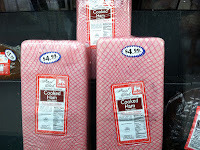 1) Spotting an inexplicable food-like product.
1) Spotting an inexplicable food-like product.
&
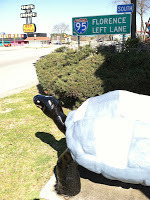 2) Befriending a creature at South of the Border.
2) Befriending a creature at South of the Border.
Often, these two can be combined in one stop, though this time the offending "ham" was spotted in North Carolina. Meet Speedy, whose shell is checkered a pleasing shade of Tarheel blue.
Last week I returned to Charleston to read at Monday Night Poetry & Music at the East Bay Meeting House. One of the pleasures of going to Charleston three times in one year is that I can now orient myself rather quickly. My first visit included an agonizing 45-minute slog through the outskirts...and I never even saw the water. This time I'd found a parking spot off East Bay and within minutes, here I was--already dreaming of the oysters I'd order at Pearlz.
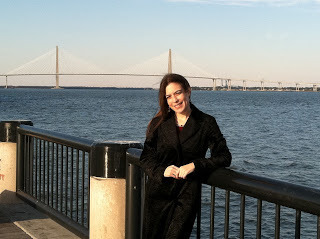
Host Jim Lundy did a great job packing the room, and he lined up charismatic guest emcee Jack Tracey so he could focus on taking pictures, which you'll find here. I was thrilled to see the faces of increasingly familiar friends, including Katrina Murphy, Richard Garcia, and many other members of the Poetry Society of South Carolina, which has to be the most vital and active state poetry society in America.
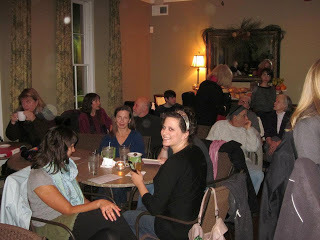
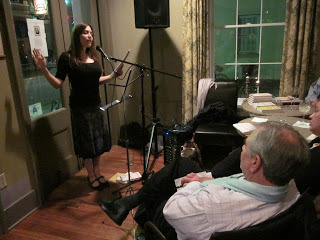
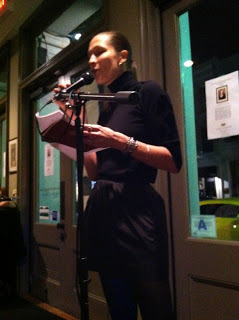
...my theory is that anytime the bartender (in this case, Brit Washburn) steps out from behind the bar and reads a great poem, you're in the right place for the night. Also, that is my face on the very nice flyer behind Brit. I will never get used to going to a place and seeing my face plastered all over the walls. It's eerie.
I was home-hosted by a member of the PSSC Board who lives in Bedon's Alley, a historic downtown neighborhood where my father and I went sight-seeing on our last trip. We wondered what the houses looked like inside. Now I know: jaw-dropping.
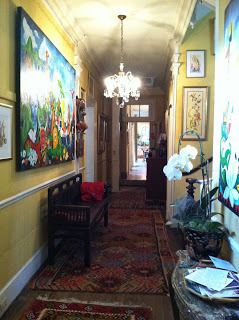
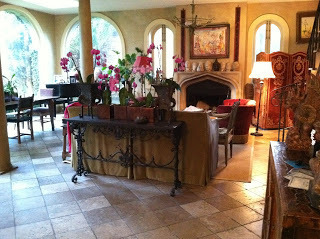
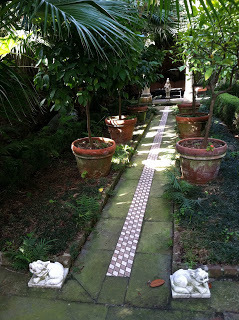
From Charleston I traveled to Georgia Southern University--a drive that turned a bit white-knuckled when I realized it would take an hour longer than I had planned for. But I made it, speeding-ticket free, and tumbled headlong into an amazing day of visiting three classes, a craft talk on projecting one's voice on the page, and a reading that drew from each of my books as well as new work. Tack on an interview for their school newspaper and a Thai dinner with two faculty members, and I was beyond beat.
The GSU students had primarily studied the memoir rather than the poetry, which I always find intimidating. But I was deeply impressed by their sensitivity to the material, their curiosity about the science and cultural history I'd woven in, and their sophisticated questions. It made me want to start another nonfiction book right away. I also welcomed the chance to re-connect with Laura Valeri, my host for the GSU visit and a talented fiction writer I first met at the Sewanee Writer's Conference. This is the surreal backyard marsh view from her living room that I woke up to the next morning...
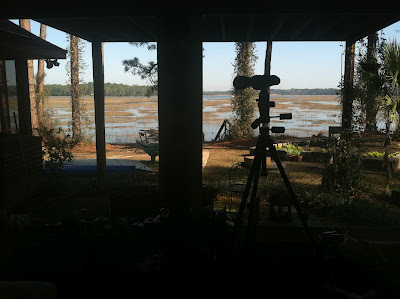
...where we drank strong coffee and nibbled on fresh-roasted peanuts her husband had made for us. So much of my book tour time is spent being "on," trying to inspire students and be mildly authoritative about navigating the challenges of publishing. But like anyone else I have doubts, failures, worries. It's important to get down off the pedestal--whether it be spent talking about love (mis)adventures at The Blind Tiger in Charleston, or commiserating over genre divides and agent adventures in a Savannah living room.
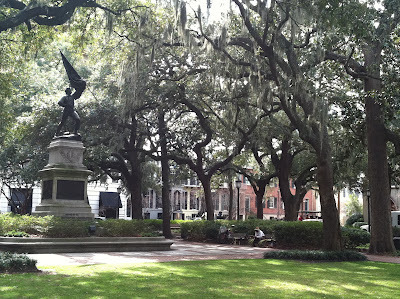
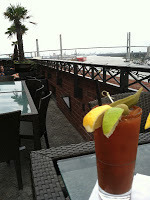
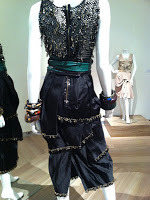 Since I'd never been to the city before, I took a few hours to get lost downtown. I called my grandmother as I walked around Forsyth Park, eating blueberries from a bag Laura had packed for me. Savannah is a surreal place, and in many ways older than Charleston; perhaps because the war memorials are as likely to be about the Revolutionary War as the Civil one. But the city is a place for fresh, edgy art, fueled by the presence of SCAD, their students, and their brand-new art museum, which features a gallery curated by André Leon Talley.
Since I'd never been to the city before, I took a few hours to get lost downtown. I called my grandmother as I walked around Forsyth Park, eating blueberries from a bag Laura had packed for me. Savannah is a surreal place, and in many ways older than Charleston; perhaps because the war memorials are as likely to be about the Revolutionary War as the Civil one. But the city is a place for fresh, edgy art, fueled by the presence of SCAD, their students, and their brand-new art museum, which features a gallery curated by André Leon Talley.
Oh, I wish my sister could have been there with me! She's the fashionista of the family.
Going from square to square appealed to me--it didn't take long to feel at home. So I do what one does when feeling at home. I found the nearest rooftop, in the Bohemian Hotel overlooking the river, ordered a Bloody Mary, and read 5o pages of a book. To be happily on a rooftop in February tells you something about Georgia weather.
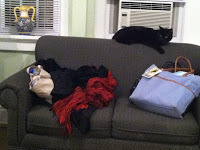 Admittedly, it was a looong drive from Savannah to Atlanta. There was some cheek-slapping and hollering to keep myself awake. There was a nap in a Chili's parking lot. But I made it--I got in around 1 AM at The Highland Inn, which is my all-time favorite artist's hostel, given room #333 (3 is my lucky number: good omen!), and told that I might be quick to see Jack--the resident cat--because I was staying next door to his owner. Jack was waiting, all right, and when I opened my door he darted in and made himself at home on the couch. I took that as another good omen. It was nice to have the company as I unpacked.
Admittedly, it was a looong drive from Savannah to Atlanta. There was some cheek-slapping and hollering to keep myself awake. There was a nap in a Chili's parking lot. But I made it--I got in around 1 AM at The Highland Inn, which is my all-time favorite artist's hostel, given room #333 (3 is my lucky number: good omen!), and told that I might be quick to see Jack--the resident cat--because I was staying next door to his owner. Jack was waiting, all right, and when I opened my door he darted in and made himself at home on the couch. I took that as another good omen. It was nice to have the company as I unpacked.
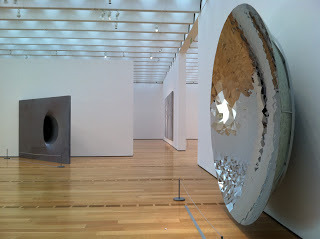
During the day I got lost at the High Museum of Art. Their "Picasso to Warhol" exhibit was a bit of a letdown--though the works are amazing, they are drawn entirely from MOMA, making it a bit redundant for anyone who has spent a lot of time in New York City. I wasn't head over heels for "The Art of Golf" either But all was redeemed by the stunning and naturally-lit upper floor of contemporary art (including a room of Gerhard Richter's work and a large Anselm Kiefer starscape that I'd never seen, even in my restrospective book of his work), the Bill Traylor exhibit tucked away on the ground floor, and the clever corkscrew design of the Stent Family Wing that tours one through different centuries of art.
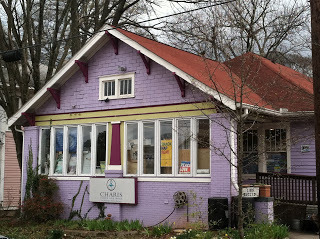
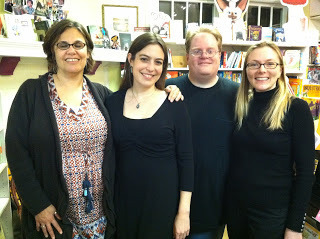
Charis Books is a fabulous bookstore with a rich history of supporting feminists and women writers. Staffer Elizabeth Anderson is the best kind of bookseller, gracious and serious about handselling the titles and authors that impress her. Though our crowd wasn't huge (it didn't help that Matthew Harvey was reading at Emory the same night, oof), I was thrilled to have an all-star crew of Atlanta writers attend. Memoirist Jessica Handler and I went out for dinner beforehand; poets Collin Kelley and Julie Bloemeke joined me for a beer at the Brewmaster's Pub after. Both times the conversation was a perfect combination of shop talk and real life. And laughter--a LOT of laughter.
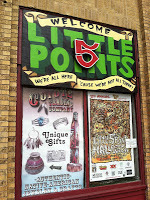 The next morning, as I should have been hustling toward that 12-hour drive home, I instead returned to wander Charis's neighborhood, Little Five Points. Whoa. You cannot think you know Atlanta until you know this place. I loved it, from the eccentric boutique The Junkman's Daughter (where pirate costumes and everyday corsets hang interchangeably on the racks), to the vinyl stores Wax n' Facts and Criminal Records, to the plethora of drafts (and glassware!) at The Porter Beer Bar, where I had delicious deconstructed adobo pork tacos. All packed in just a few dense blocks around the intersection of Moreland, Masfield, and Euclid. I've got to go back.
The next morning, as I should have been hustling toward that 12-hour drive home, I instead returned to wander Charis's neighborhood, Little Five Points. Whoa. You cannot think you know Atlanta until you know this place. I loved it, from the eccentric boutique The Junkman's Daughter (where pirate costumes and everyday corsets hang interchangeably on the racks), to the vinyl stores Wax n' Facts and Criminal Records, to the plethora of drafts (and glassware!) at The Porter Beer Bar, where I had delicious deconstructed adobo pork tacos. All packed in just a few dense blocks around the intersection of Moreland, Masfield, and Euclid. I've got to go back.
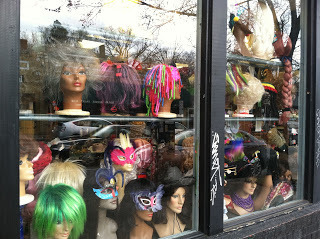
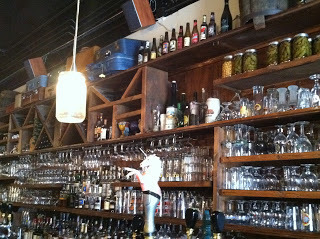
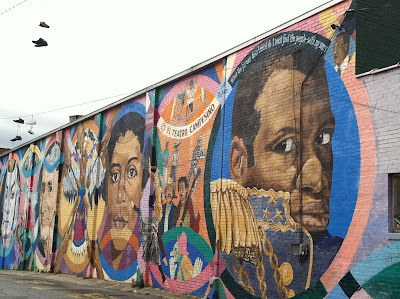
But sadly...I can't go back just yet. For now, I must pack my bags for AWP in Chicago, then a reading in Urbana on my way back home. Always, the next drive is waiting.
This week my poem "The Old Riddle" went up over at Site 95, an intriguing project curated by Meaghan Kent that combines visual arts and writing from up and down the East coast, with related on-site installations in New York, Miami, and elsewhere. (Site "95" = I-95, eh?) The poem is from the third collection I am working on now--a manuscript that deals with romantic love--and it definitely captures some of my experiences in the last few years. But it doesn't reflect my today. Today, my heart is full.
 1) Spotting an inexplicable food-like product.
1) Spotting an inexplicable food-like product.&
 2) Befriending a creature at South of the Border.
2) Befriending a creature at South of the Border.Often, these two can be combined in one stop, though this time the offending "ham" was spotted in North Carolina. Meet Speedy, whose shell is checkered a pleasing shade of Tarheel blue.
Last week I returned to Charleston to read at Monday Night Poetry & Music at the East Bay Meeting House. One of the pleasures of going to Charleston three times in one year is that I can now orient myself rather quickly. My first visit included an agonizing 45-minute slog through the outskirts...and I never even saw the water. This time I'd found a parking spot off East Bay and within minutes, here I was--already dreaming of the oysters I'd order at Pearlz.

Host Jim Lundy did a great job packing the room, and he lined up charismatic guest emcee Jack Tracey so he could focus on taking pictures, which you'll find here. I was thrilled to see the faces of increasingly familiar friends, including Katrina Murphy, Richard Garcia, and many other members of the Poetry Society of South Carolina, which has to be the most vital and active state poetry society in America.



...my theory is that anytime the bartender (in this case, Brit Washburn) steps out from behind the bar and reads a great poem, you're in the right place for the night. Also, that is my face on the very nice flyer behind Brit. I will never get used to going to a place and seeing my face plastered all over the walls. It's eerie.
I was home-hosted by a member of the PSSC Board who lives in Bedon's Alley, a historic downtown neighborhood where my father and I went sight-seeing on our last trip. We wondered what the houses looked like inside. Now I know: jaw-dropping.



From Charleston I traveled to Georgia Southern University--a drive that turned a bit white-knuckled when I realized it would take an hour longer than I had planned for. But I made it, speeding-ticket free, and tumbled headlong into an amazing day of visiting three classes, a craft talk on projecting one's voice on the page, and a reading that drew from each of my books as well as new work. Tack on an interview for their school newspaper and a Thai dinner with two faculty members, and I was beyond beat.
The GSU students had primarily studied the memoir rather than the poetry, which I always find intimidating. But I was deeply impressed by their sensitivity to the material, their curiosity about the science and cultural history I'd woven in, and their sophisticated questions. It made me want to start another nonfiction book right away. I also welcomed the chance to re-connect with Laura Valeri, my host for the GSU visit and a talented fiction writer I first met at the Sewanee Writer's Conference. This is the surreal backyard marsh view from her living room that I woke up to the next morning...

...where we drank strong coffee and nibbled on fresh-roasted peanuts her husband had made for us. So much of my book tour time is spent being "on," trying to inspire students and be mildly authoritative about navigating the challenges of publishing. But like anyone else I have doubts, failures, worries. It's important to get down off the pedestal--whether it be spent talking about love (mis)adventures at The Blind Tiger in Charleston, or commiserating over genre divides and agent adventures in a Savannah living room.


 Since I'd never been to the city before, I took a few hours to get lost downtown. I called my grandmother as I walked around Forsyth Park, eating blueberries from a bag Laura had packed for me. Savannah is a surreal place, and in many ways older than Charleston; perhaps because the war memorials are as likely to be about the Revolutionary War as the Civil one. But the city is a place for fresh, edgy art, fueled by the presence of SCAD, their students, and their brand-new art museum, which features a gallery curated by André Leon Talley.
Since I'd never been to the city before, I took a few hours to get lost downtown. I called my grandmother as I walked around Forsyth Park, eating blueberries from a bag Laura had packed for me. Savannah is a surreal place, and in many ways older than Charleston; perhaps because the war memorials are as likely to be about the Revolutionary War as the Civil one. But the city is a place for fresh, edgy art, fueled by the presence of SCAD, their students, and their brand-new art museum, which features a gallery curated by André Leon Talley. Oh, I wish my sister could have been there with me! She's the fashionista of the family.
Going from square to square appealed to me--it didn't take long to feel at home. So I do what one does when feeling at home. I found the nearest rooftop, in the Bohemian Hotel overlooking the river, ordered a Bloody Mary, and read 5o pages of a book. To be happily on a rooftop in February tells you something about Georgia weather.
 Admittedly, it was a looong drive from Savannah to Atlanta. There was some cheek-slapping and hollering to keep myself awake. There was a nap in a Chili's parking lot. But I made it--I got in around 1 AM at The Highland Inn, which is my all-time favorite artist's hostel, given room #333 (3 is my lucky number: good omen!), and told that I might be quick to see Jack--the resident cat--because I was staying next door to his owner. Jack was waiting, all right, and when I opened my door he darted in and made himself at home on the couch. I took that as another good omen. It was nice to have the company as I unpacked.
Admittedly, it was a looong drive from Savannah to Atlanta. There was some cheek-slapping and hollering to keep myself awake. There was a nap in a Chili's parking lot. But I made it--I got in around 1 AM at The Highland Inn, which is my all-time favorite artist's hostel, given room #333 (3 is my lucky number: good omen!), and told that I might be quick to see Jack--the resident cat--because I was staying next door to his owner. Jack was waiting, all right, and when I opened my door he darted in and made himself at home on the couch. I took that as another good omen. It was nice to have the company as I unpacked.
During the day I got lost at the High Museum of Art. Their "Picasso to Warhol" exhibit was a bit of a letdown--though the works are amazing, they are drawn entirely from MOMA, making it a bit redundant for anyone who has spent a lot of time in New York City. I wasn't head over heels for "The Art of Golf" either But all was redeemed by the stunning and naturally-lit upper floor of contemporary art (including a room of Gerhard Richter's work and a large Anselm Kiefer starscape that I'd never seen, even in my restrospective book of his work), the Bill Traylor exhibit tucked away on the ground floor, and the clever corkscrew design of the Stent Family Wing that tours one through different centuries of art.


Charis Books is a fabulous bookstore with a rich history of supporting feminists and women writers. Staffer Elizabeth Anderson is the best kind of bookseller, gracious and serious about handselling the titles and authors that impress her. Though our crowd wasn't huge (it didn't help that Matthew Harvey was reading at Emory the same night, oof), I was thrilled to have an all-star crew of Atlanta writers attend. Memoirist Jessica Handler and I went out for dinner beforehand; poets Collin Kelley and Julie Bloemeke joined me for a beer at the Brewmaster's Pub after. Both times the conversation was a perfect combination of shop talk and real life. And laughter--a LOT of laughter.
 The next morning, as I should have been hustling toward that 12-hour drive home, I instead returned to wander Charis's neighborhood, Little Five Points. Whoa. You cannot think you know Atlanta until you know this place. I loved it, from the eccentric boutique The Junkman's Daughter (where pirate costumes and everyday corsets hang interchangeably on the racks), to the vinyl stores Wax n' Facts and Criminal Records, to the plethora of drafts (and glassware!) at The Porter Beer Bar, where I had delicious deconstructed adobo pork tacos. All packed in just a few dense blocks around the intersection of Moreland, Masfield, and Euclid. I've got to go back.
The next morning, as I should have been hustling toward that 12-hour drive home, I instead returned to wander Charis's neighborhood, Little Five Points. Whoa. You cannot think you know Atlanta until you know this place. I loved it, from the eccentric boutique The Junkman's Daughter (where pirate costumes and everyday corsets hang interchangeably on the racks), to the vinyl stores Wax n' Facts and Criminal Records, to the plethora of drafts (and glassware!) at The Porter Beer Bar, where I had delicious deconstructed adobo pork tacos. All packed in just a few dense blocks around the intersection of Moreland, Masfield, and Euclid. I've got to go back. 


But sadly...I can't go back just yet. For now, I must pack my bags for AWP in Chicago, then a reading in Urbana on my way back home. Always, the next drive is waiting.
This week my poem "The Old Riddle" went up over at Site 95, an intriguing project curated by Meaghan Kent that combines visual arts and writing from up and down the East coast, with related on-site installations in New York, Miami, and elsewhere. (Site "95" = I-95, eh?) The poem is from the third collection I am working on now--a manuscript that deals with romantic love--and it definitely captures some of my experiences in the last few years. But it doesn't reflect my today. Today, my heart is full.
Published on February 27, 2012 12:48
February 15, 2012
Sugarlicious
Like many MFA programs, my time at American University gathered together word lovers & English majors with a somewhat amorphous vision of what it actually meant to be a "writer." So one of the great pleasures of growing older is seeing the varied paths that my classmates (and in particular, a group of women with whom I shared many a birthday and brunch) have gone forward and taken in the world. One became a media specialist for the National Endowment for the Arts; one just took a job assisting in the direction of a university institute of ESL & American Studies; one has found happiness in freelancing and motherhood; one is a government worker by day, a renowned slam poet by night.
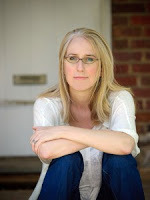 Meaghan Mountford has taken one of the bravest paths by bringing her smart, funny voice to a genre so often riddled with banality: cookbooks, specifically baking books. Drawing upon years of experience as designer and manager at Bundles of Cookies in Bethesda, in 2007 Meaghan published
Cookie Sensations: Creative Designs for Every Occasion
. Her creations have been featured everywhere from Brides, to The Washington Post, to The New York Times, to umpteen thousand websites; her cookies were a finalist for favorite favors on "The Today Show Throws a Wedding." At her own Las Vegas wedding, each of our tables were adorned with individually wrapped, handmade, and incredibly detailed cookies depicting everything from a splay of playing cards to Elvis himself.
Meaghan Mountford has taken one of the bravest paths by bringing her smart, funny voice to a genre so often riddled with banality: cookbooks, specifically baking books. Drawing upon years of experience as designer and manager at Bundles of Cookies in Bethesda, in 2007 Meaghan published
Cookie Sensations: Creative Designs for Every Occasion
. Her creations have been featured everywhere from Brides, to The Washington Post, to The New York Times, to umpteen thousand websites; her cookies were a finalist for favorite favors on "The Today Show Throws a Wedding." At her own Las Vegas wedding, each of our tables were adorned with individually wrapped, handmade, and incredibly detailed cookies depicting everything from a splay of playing cards to Elvis himself.
This month marks the publication of Sugarlicious, her second collection of recipes. You can watch the adorable trailer here (1,300 views already! and I can't get that sweetly chipper banjo song out of my head!). There are also a number of giveaways, chats, etc. going on around the web that you can find details on here.
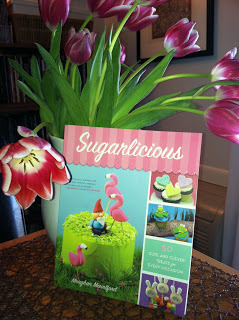 When my copy arrived in the mail this week, I first took this glamorshot with my Valentine tulips--appreciating the great deal of care that Harlequin took with the production values. What a physically gorgeous book, and perfect page weight, too: heavy enough to stay flat when you open it. But I opened my copy with a touch of trepidation. As an allergy girl--totally unable to work with milk or eggs in my kitchen--would I be able to relate to these concepts? Or would it be a bittersweet survey of all I could never experience firsthand?
When my copy arrived in the mail this week, I first took this glamorshot with my Valentine tulips--appreciating the great deal of care that Harlequin took with the production values. What a physically gorgeous book, and perfect page weight, too: heavy enough to stay flat when you open it. But I opened my copy with a touch of trepidation. As an allergy girl--totally unable to work with milk or eggs in my kitchen--would I be able to relate to these concepts? Or would it be a bittersweet survey of all I could never experience firsthand?
I need not have worried. Anyone with a flair for design can appreciate Sugarlicious, which will develop in even the most timid baker an accessible and modular set of skills--melting coatings, shaping and coloring fondant, drawing with edible-ink pens--that can then be combined into any number of vibrant creations. One of Meaghan's niches is her innovation with using marshmallows as a focal point; she takes sweets that were once useful for nothing more than the garnish on a gingerbread house and turns them into canvasses for villages, zombies, and "kabobs." Here is the layout telling you how to make the latter:
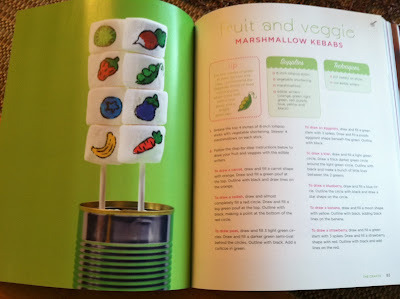
...while I realize you might need to squint to see it, note that she shows you how to draw each one of those fruit and veggie designs. Swift, funky cartooning is an art; having labored over many a step-by-step guide to drafting horses and bunnies way back when, I appreciate how difficult it is to create a formula for an recognizable, iconic shape. Marshmallows were one of my favorite (read: only) treats as a kind--no egg, no dairy, just sugar and gelatin--but they were a bland afterthought to the other kids, who obsessed over decorating cookies and cupcakes I could not touch. I'd have loved a party where the entertainment was making marshmallow kabobs! A new generation of allergic kids can take advantage of Meaghan's insight and handy instructions.
The book's attention to detail is a pleasure throughout, as are the vibrant photographs. While the designs are whimsical (garden gnomes partying down with pink flamingoes? Yes please~), Sugarlicious is organized in a practical manner that features articulated lists of "supplies" and "techniques" for each recipe, section dividers such as "Holidays & Seasons," a glossary of ingredients and tools, and a thorough index. Showing she hasn't lost her touch since Vegas, Meaghan is particularly good at designing desserts that double as table decorations. Why pay for flowers if you can have a centerpiece that is 10x as unique...and edible at the end of the night? Or, in the case of the layout below, you can use treats in lieu of place cards. It's a heck of a lot more appealing than a few Jordan almonds scattered around a tent-card lettered with pseudo-calligraphy.
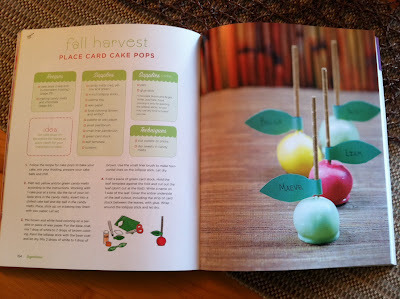
Meaghan Mountford is an incredible writer, with a curious eye and unfailing energy. You can find evidence of that at the two blogs she simultaneously maintains, The Decorated Cookie & Edible Crafts. She's also an MFA-er savvy to the larger world of publishing, as this blog post detailing her road to a book deal attests. Harlequin and the cooking world are lucky to have her; you'd be lucky to have this book. Sugarlicious makes me want to get my hands messy--with flour, sugar, food coloring--and for a perfectionist neatnik like me that's a true compliment. This is the kind of book that guarantees an amazing Saturday afternoon.
 Meaghan Mountford has taken one of the bravest paths by bringing her smart, funny voice to a genre so often riddled with banality: cookbooks, specifically baking books. Drawing upon years of experience as designer and manager at Bundles of Cookies in Bethesda, in 2007 Meaghan published
Cookie Sensations: Creative Designs for Every Occasion
. Her creations have been featured everywhere from Brides, to The Washington Post, to The New York Times, to umpteen thousand websites; her cookies were a finalist for favorite favors on "The Today Show Throws a Wedding." At her own Las Vegas wedding, each of our tables were adorned with individually wrapped, handmade, and incredibly detailed cookies depicting everything from a splay of playing cards to Elvis himself.
Meaghan Mountford has taken one of the bravest paths by bringing her smart, funny voice to a genre so often riddled with banality: cookbooks, specifically baking books. Drawing upon years of experience as designer and manager at Bundles of Cookies in Bethesda, in 2007 Meaghan published
Cookie Sensations: Creative Designs for Every Occasion
. Her creations have been featured everywhere from Brides, to The Washington Post, to The New York Times, to umpteen thousand websites; her cookies were a finalist for favorite favors on "The Today Show Throws a Wedding." At her own Las Vegas wedding, each of our tables were adorned with individually wrapped, handmade, and incredibly detailed cookies depicting everything from a splay of playing cards to Elvis himself. This month marks the publication of Sugarlicious, her second collection of recipes. You can watch the adorable trailer here (1,300 views already! and I can't get that sweetly chipper banjo song out of my head!). There are also a number of giveaways, chats, etc. going on around the web that you can find details on here.
 When my copy arrived in the mail this week, I first took this glamorshot with my Valentine tulips--appreciating the great deal of care that Harlequin took with the production values. What a physically gorgeous book, and perfect page weight, too: heavy enough to stay flat when you open it. But I opened my copy with a touch of trepidation. As an allergy girl--totally unable to work with milk or eggs in my kitchen--would I be able to relate to these concepts? Or would it be a bittersweet survey of all I could never experience firsthand?
When my copy arrived in the mail this week, I first took this glamorshot with my Valentine tulips--appreciating the great deal of care that Harlequin took with the production values. What a physically gorgeous book, and perfect page weight, too: heavy enough to stay flat when you open it. But I opened my copy with a touch of trepidation. As an allergy girl--totally unable to work with milk or eggs in my kitchen--would I be able to relate to these concepts? Or would it be a bittersweet survey of all I could never experience firsthand? I need not have worried. Anyone with a flair for design can appreciate Sugarlicious, which will develop in even the most timid baker an accessible and modular set of skills--melting coatings, shaping and coloring fondant, drawing with edible-ink pens--that can then be combined into any number of vibrant creations. One of Meaghan's niches is her innovation with using marshmallows as a focal point; she takes sweets that were once useful for nothing more than the garnish on a gingerbread house and turns them into canvasses for villages, zombies, and "kabobs." Here is the layout telling you how to make the latter:

...while I realize you might need to squint to see it, note that she shows you how to draw each one of those fruit and veggie designs. Swift, funky cartooning is an art; having labored over many a step-by-step guide to drafting horses and bunnies way back when, I appreciate how difficult it is to create a formula for an recognizable, iconic shape. Marshmallows were one of my favorite (read: only) treats as a kind--no egg, no dairy, just sugar and gelatin--but they were a bland afterthought to the other kids, who obsessed over decorating cookies and cupcakes I could not touch. I'd have loved a party where the entertainment was making marshmallow kabobs! A new generation of allergic kids can take advantage of Meaghan's insight and handy instructions.
The book's attention to detail is a pleasure throughout, as are the vibrant photographs. While the designs are whimsical (garden gnomes partying down with pink flamingoes? Yes please~), Sugarlicious is organized in a practical manner that features articulated lists of "supplies" and "techniques" for each recipe, section dividers such as "Holidays & Seasons," a glossary of ingredients and tools, and a thorough index. Showing she hasn't lost her touch since Vegas, Meaghan is particularly good at designing desserts that double as table decorations. Why pay for flowers if you can have a centerpiece that is 10x as unique...and edible at the end of the night? Or, in the case of the layout below, you can use treats in lieu of place cards. It's a heck of a lot more appealing than a few Jordan almonds scattered around a tent-card lettered with pseudo-calligraphy.

Meaghan Mountford is an incredible writer, with a curious eye and unfailing energy. You can find evidence of that at the two blogs she simultaneously maintains, The Decorated Cookie & Edible Crafts. She's also an MFA-er savvy to the larger world of publishing, as this blog post detailing her road to a book deal attests. Harlequin and the cooking world are lucky to have her; you'd be lucky to have this book. Sugarlicious makes me want to get my hands messy--with flour, sugar, food coloring--and for a perfectionist neatnik like me that's a true compliment. This is the kind of book that guarantees an amazing Saturday afternoon.
Published on February 15, 2012 02:36
February 3, 2012
Trust Your Eye: On Ordering Poetry
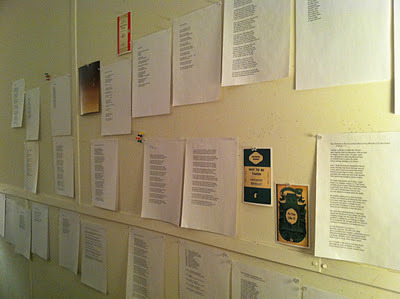
One of the pleasures of my recent stay at Virginia Center for Creative Arts was the chance to spread out the pages of my manuscript-in-progress. This is something I've been able to do with each of my poetry collections, first on the walls of my studio at the Millay Colony and then on the floor of my apartment in DC. But I live in a much smaller apartment now, so this was my first chance to look at Count the Waves in this way. In the snapshot above, the far left is the end of the first section, curving upwards in a confident curl (that one feels most complete); then a cluster of colored push-pins marks the initiation of the second section, shaped like the symbol for long division; the third section, in the lower right, is pretty amoebalike at this stage.
I've helped many friends and students order their collections over the past five years, and one thing I always say is Trust your eye. What I mean is that reading is not just an intellectual experience, but a physical one. Some poems are more tiring to read than others--even if their richness is worth the effort. Though it is often smart to group poems according to voice or motif, make sure there is some variety of form on the page to keep the reader's energy level up. It's the same common sense as alternating moves in a work-out. You need to look at poems en masse, as shapes. Is the quatrain growing monotonous? Scan to make sure you haven't ended on the same word or syntactic trick three times in a row, even if it is a justified ending each time in & of itself.
A few nights I purposefully slept in the bed VCCA provided in my studio so I could wake, bleary-eyed and slightly disoriented, to look at pages on the wall without awareness of individual texts. In this way I noticed my dominant line lengths and stanza structures, and saw places where I could resist those modes in meaningful ways. I found sequences that felt too "light" or too "heavy." I realized I couldn't have two "valentine" sestinas side by side, no matter how well they matched thematically.
Later in the day and after a few cups of coffee, I continued to work in a way unique to this bulletin-board display style. I could flip up the latest draft to look at the previous days' drafts layered beneath it. When I pulled a poem out of sequence the empty rectangle that remained pushed me to interrogate what was needed to fill the hole--what question I had not yet asked of myself or of the collection. Sometimes I would pin up a page blank except for a title, then scribble & riff until something caught hold. (One night I had a visitor whose gaze became distracted; I soon realize he'd spied a blue-ink scrawl of "astral spunk.")
By the time I left VCCA, I had written six new poems in three weeks. But just as importantly I committed to a whole new sequence in the third section, to balance a sequence in the first. I realized my closing poem was not really my closing poem, if only because it is ekphrasis and I don't want to share my ending with Whistler's drawings. I pulled a poem that had been discarded back in to open the second section, realizing that what I had worried to be its weakness--direct language, short lines--is the perfect parry before the winding, punny poem that will follow it. I love it when a poem you had a private affection for suddenly reclaims a home; it's like finding a $20 bill squinched into an old coat pocket.
A book isn't a project. A book isn't a pet. A book a lover, and you have to get to know it on all levels--mind, body, and soul. I'm glad to find out we're ready to live together.
This post is featured over at the SheWrites blog, where I served as a guest editor this week. Check out the wonderful posts contributed by my fellow writers:
Laura Susanne Yochelson - "Enjoying the Process"
Bernadette Geyer - "What? It's Possible to Keep Writing After a Kid?"
Jeannine Hall Gailey - "How I Became a Poet, Or, Why I Write About Superheroines"
Eugenia Kim - "Romance of the Writing Life and Where the Writing Happens"
Lisa Fay Coutley - "Sentimentality Be Damned: On Gratitude"
Published on February 03, 2012 08:28
February 1, 2012
VCCA (Off I Go)
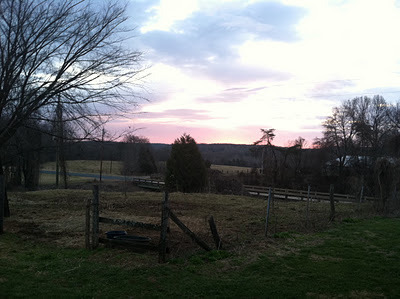
Oh, sun! Damn you. You might as well rise.
At my last VCCA dinner, I looked over and saw a table of entirely new folks, unfamiliar faces all having the same conversation I had three weeks ago--Where are you from? What are you working on?--and I thought, It's time to go. The totally superfluous helping of cauliflower drenched in Sriracha sauce while everyone else got dessert? Pairing another glass of zinfandel with a mug of full-strength coffee? Also signs that it's time to go. One of the things I've learned about myself is that I'm really good at being away from home for about three weeks. But if I'm gone for four weeks or more, something gets broken.
Then we had a Fellows reading that illuminated two women I've been sharing tables with for days. One poet I now want to talk to about formal poetry, Anna Akhmatova, South Carolina. One nonfictioneer I want to talk to about biography, Africa, self-doubt. These will not be conversations I get to have. We sat in the living room after their reading, laughing and talking, but I wanted more. I wanted a colder day so we could use the fireplace one last time. I can't be going already!
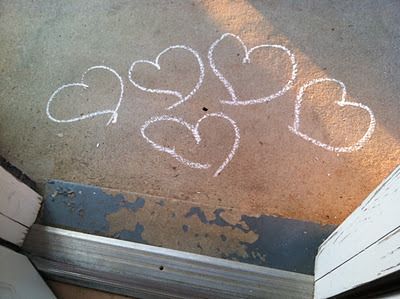
It is easy to be glib about friendships you make at art colonies. A photographer and I were joking about it on our walk back to the main house. "I wish he were younger..." he said of a third resident, "...but I already know why it wouldn't work." Another artist I overheard say "Let me get your email, so we can do that thing where we never get around to actually writing each other." You go from 0 to 60 MPH in terms of confession, intimacy, irritation. For so many of us, at home our work is both the thing we love best about ourselves and the thing most isolating. Here, the latter half of that drops away. The problem with getting to know people at their best is that their worst, when discovered, comes as a much harsher shock. And I of all people know that.
Still I delight. I open the studio door at 4 AM to find hearts chalked in lieu of a doormat, and I delight. This is not a place to bother keeping your guard up.
I got the writing done. Poems, prose, even something that paid. That gives me comfort as I ponder packing bags (did I really need this many skirts and sweaters?) and pulling push-pins out of the wall. Count the Waves is coming together. I refined sestinas, rescued a poem from banishment, embraced my animalia, committed to a new sequence, gave a reading that left me feeling hopeful. This third poetry manuscript is harder than the last but maybe it is richer, too, pleasures hidden a little under the surface. I just have to provide enough glimmer to tempt a reader to do the digging.
See you on the flipside, friends.
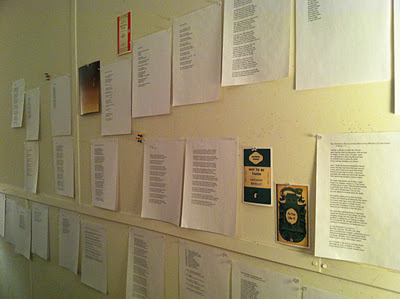
Published on February 01, 2012 04:25



